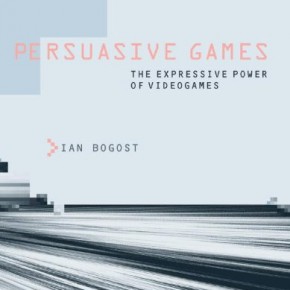 Ian Bogost is author of the book Persuasive Games: The Expressive Power of Videogames (MIT Press 2007). In his book Bogost argues, that videogames have a unique persuasive power that goes beyond other forms of computational persuasion. Not only can videogames support existing social and cultural positions, but they can also disrupt and change these positions themselves, leading to potentially significant long-term social change. Bogost looks at three areas in which videogame persuasion has already taken form and shows considerable potential: politics, advertising, and learning.
Ian Bogost is author of the book Persuasive Games: The Expressive Power of Videogames (MIT Press 2007). In his book Bogost argues, that videogames have a unique persuasive power that goes beyond other forms of computational persuasion. Not only can videogames support existing social and cultural positions, but they can also disrupt and change these positions themselves, leading to potentially significant long-term social change. Bogost looks at three areas in which videogame persuasion has already taken form and shows considerable potential: politics, advertising, and learning.
Exploitationware
I also found an interesting essay, called ‘Persuasive Games: Exploitationware’ that Bogost recently published at gamasutra.com. In the article Bogost writes critically about rhetoric of gamification and suggests a new name for gamification altogether: Exploitationware. It’s an interesting read. I singled out two quotes:
“…because games are systems, they offer a fundamentally different way of characterizing ideas. They can inspire a different kind of deliberation than we find in other forms of media, one that considers the uncertainty of complex systems instead of embracing simple answers. It’s this potential that has inspired me to advocate for the uses of games in areas like learning, politics, journalism, and business.”
and
“Doing real, meaningful things with games is hard and risky, but it offers considerable reward, reward that responds to the underlying shift away from the logic of industrialization that gamification takes for granted.”
Head over to gamasutra.com the read the full article.




